Health Advancement: ADS3355 Essay on Cannabis Legalization Impact
VerifiedAdded on 2023/06/14
|8
|2089
|360
Essay
AI Summary
This essay summarizes and analyzes the impact of cannabis legalization on public health, focusing on different consumption methods like smoking, vaping, and edibles. It reviews an article discussing the effects of medical marijuana laws on cannabis use and the perceived risks. The essay highlights that while legalization can generate revenue and offer medical benefits, it also carries risks of addiction and adverse health effects. It advocates for regulations to control cannabis use and promote safer consumption methods like vaping and edibles over smoking due to the latter's impact on the respiratory system. The letter to the editor included expresses concerns and supports legalization with proper regulations, emphasizing the potential medical benefits and economic advantages while advocating for responsible consumption to avoid adverse health outcomes. Desklib provides students access to similar solved assignments and resources for further study.
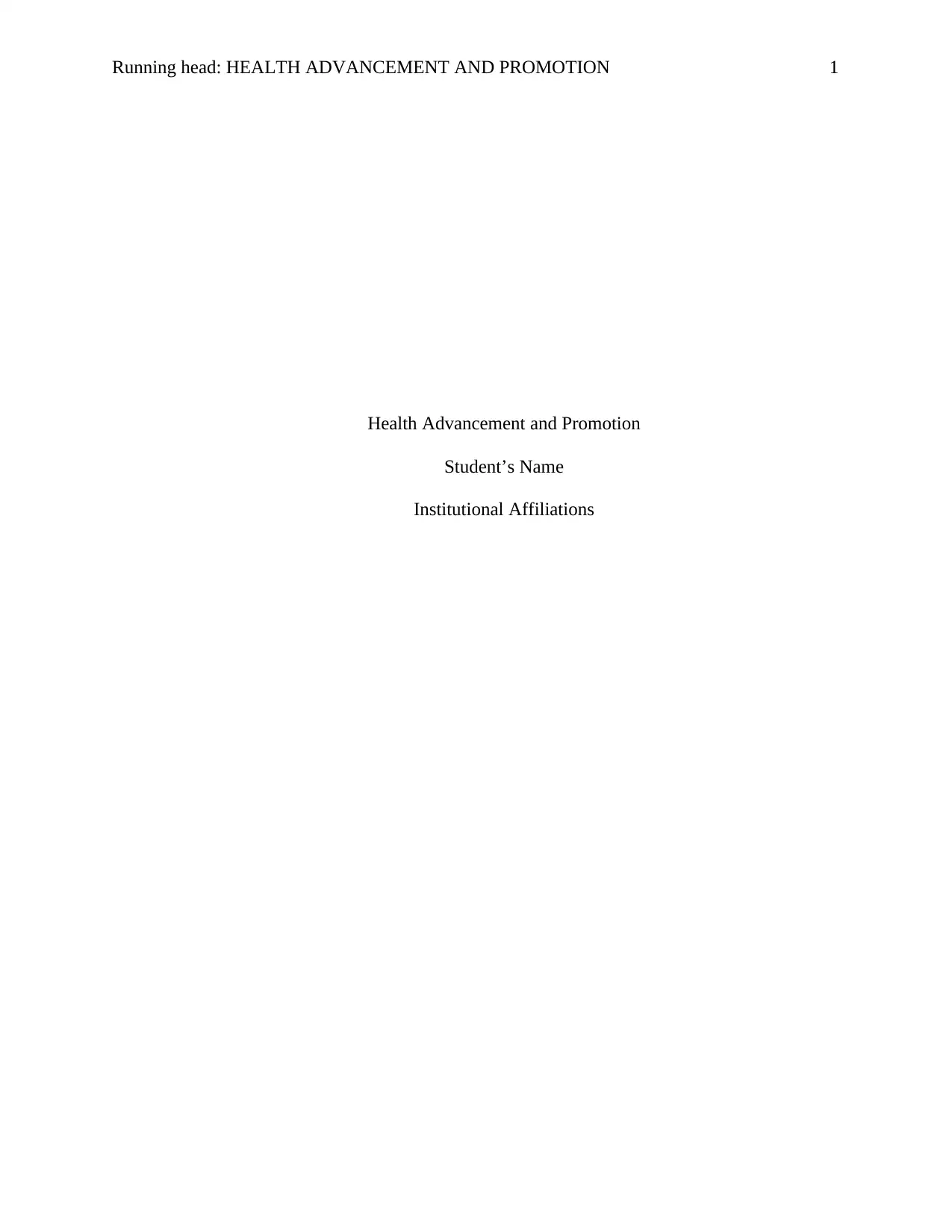
Running head: HEALTH ADVANCEMENT AND PROMOTION 1
Health Advancement and Promotion
Student’s Name
Institutional Affiliations
Health Advancement and Promotion
Student’s Name
Institutional Affiliations
Paraphrase This Document
Need a fresh take? Get an instant paraphrase of this document with our AI Paraphraser
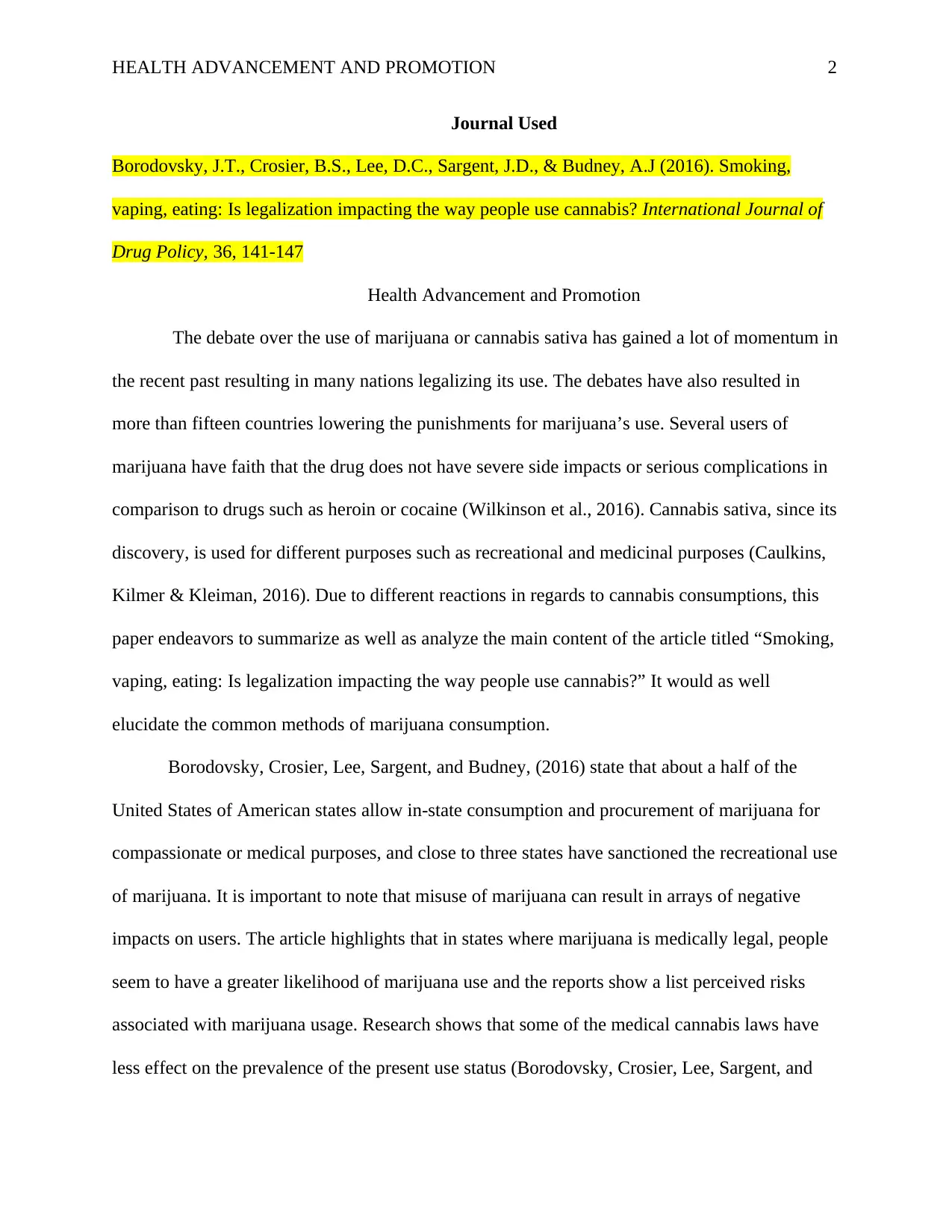
HEALTH ADVANCEMENT AND PROMOTION 2
Journal Used
Borodovsky, J.T., Crosier, B.S., Lee, D.C., Sargent, J.D., & Budney, A.J (2016). Smoking,
vaping, eating: Is legalization impacting the way people use cannabis? International Journal of
Drug Policy, 36, 141-147
Health Advancement and Promotion
The debate over the use of marijuana or cannabis sativa has gained a lot of momentum in
the recent past resulting in many nations legalizing its use. The debates have also resulted in
more than fifteen countries lowering the punishments for marijuana’s use. Several users of
marijuana have faith that the drug does not have severe side impacts or serious complications in
comparison to drugs such as heroin or cocaine (Wilkinson et al., 2016). Cannabis sativa, since its
discovery, is used for different purposes such as recreational and medicinal purposes (Caulkins,
Kilmer & Kleiman, 2016). Due to different reactions in regards to cannabis consumptions, this
paper endeavors to summarize as well as analyze the main content of the article titled “Smoking,
vaping, eating: Is legalization impacting the way people use cannabis?” It would as well
elucidate the common methods of marijuana consumption.
Borodovsky, Crosier, Lee, Sargent, and Budney, (2016) state that about a half of the
United States of American states allow in-state consumption and procurement of marijuana for
compassionate or medical purposes, and close to three states have sanctioned the recreational use
of marijuana. It is important to note that misuse of marijuana can result in arrays of negative
impacts on users. The article highlights that in states where marijuana is medically legal, people
seem to have a greater likelihood of marijuana use and the reports show a list perceived risks
associated with marijuana usage. Research shows that some of the medical cannabis laws have
less effect on the prevalence of the present use status (Borodovsky, Crosier, Lee, Sargent, and
Journal Used
Borodovsky, J.T., Crosier, B.S., Lee, D.C., Sargent, J.D., & Budney, A.J (2016). Smoking,
vaping, eating: Is legalization impacting the way people use cannabis? International Journal of
Drug Policy, 36, 141-147
Health Advancement and Promotion
The debate over the use of marijuana or cannabis sativa has gained a lot of momentum in
the recent past resulting in many nations legalizing its use. The debates have also resulted in
more than fifteen countries lowering the punishments for marijuana’s use. Several users of
marijuana have faith that the drug does not have severe side impacts or serious complications in
comparison to drugs such as heroin or cocaine (Wilkinson et al., 2016). Cannabis sativa, since its
discovery, is used for different purposes such as recreational and medicinal purposes (Caulkins,
Kilmer & Kleiman, 2016). Due to different reactions in regards to cannabis consumptions, this
paper endeavors to summarize as well as analyze the main content of the article titled “Smoking,
vaping, eating: Is legalization impacting the way people use cannabis?” It would as well
elucidate the common methods of marijuana consumption.
Borodovsky, Crosier, Lee, Sargent, and Budney, (2016) state that about a half of the
United States of American states allow in-state consumption and procurement of marijuana for
compassionate or medical purposes, and close to three states have sanctioned the recreational use
of marijuana. It is important to note that misuse of marijuana can result in arrays of negative
impacts on users. The article highlights that in states where marijuana is medically legal, people
seem to have a greater likelihood of marijuana use and the reports show a list perceived risks
associated with marijuana usage. Research shows that some of the medical cannabis laws have
less effect on the prevalence of the present use status (Borodovsky, Crosier, Lee, Sargent, and
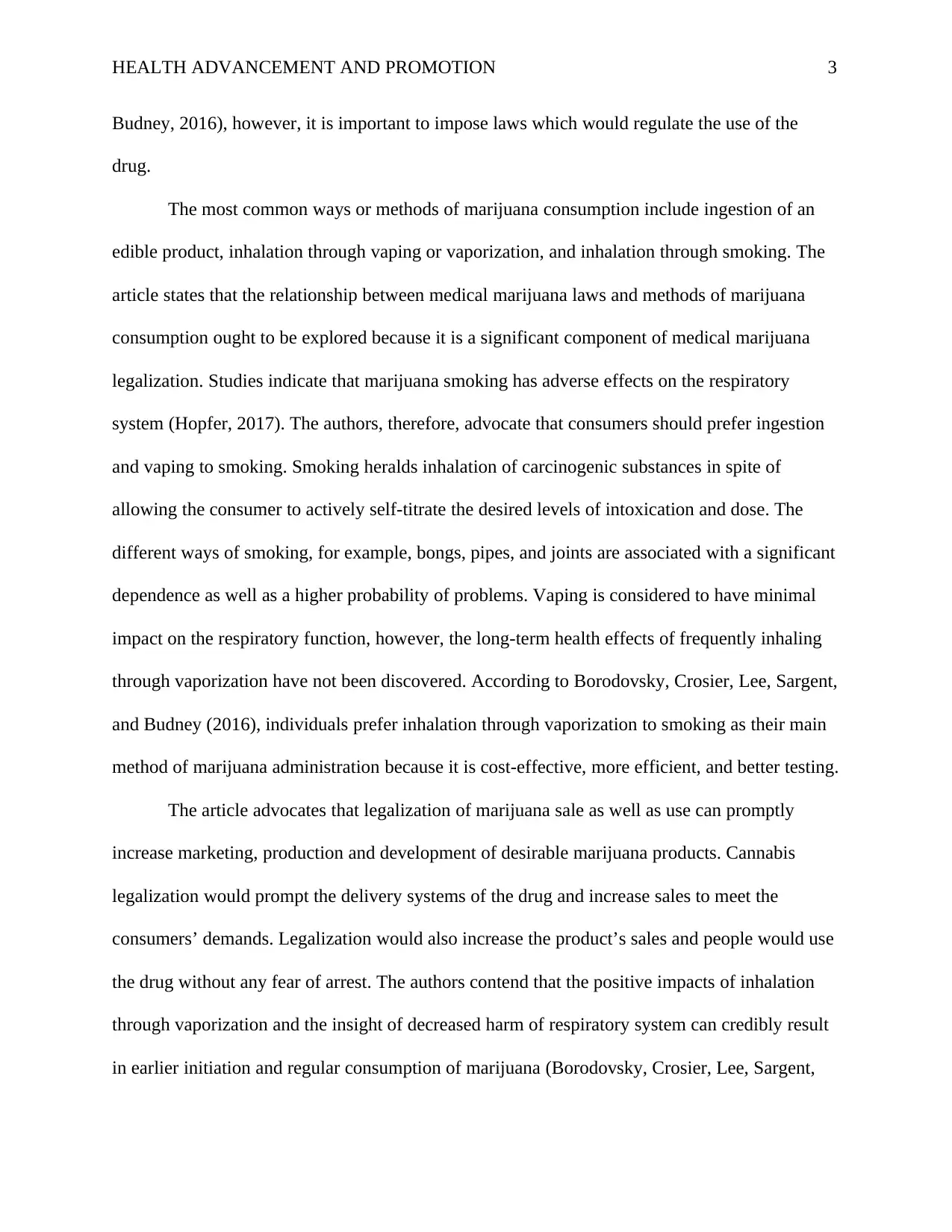
HEALTH ADVANCEMENT AND PROMOTION 3
Budney, 2016), however, it is important to impose laws which would regulate the use of the
drug.
The most common ways or methods of marijuana consumption include ingestion of an
edible product, inhalation through vaping or vaporization, and inhalation through smoking. The
article states that the relationship between medical marijuana laws and methods of marijuana
consumption ought to be explored because it is a significant component of medical marijuana
legalization. Studies indicate that marijuana smoking has adverse effects on the respiratory
system (Hopfer, 2017). The authors, therefore, advocate that consumers should prefer ingestion
and vaping to smoking. Smoking heralds inhalation of carcinogenic substances in spite of
allowing the consumer to actively self-titrate the desired levels of intoxication and dose. The
different ways of smoking, for example, bongs, pipes, and joints are associated with a significant
dependence as well as a higher probability of problems. Vaping is considered to have minimal
impact on the respiratory function, however, the long-term health effects of frequently inhaling
through vaporization have not been discovered. According to Borodovsky, Crosier, Lee, Sargent,
and Budney (2016), individuals prefer inhalation through vaporization to smoking as their main
method of marijuana administration because it is cost-effective, more efficient, and better testing.
The article advocates that legalization of marijuana sale as well as use can promptly
increase marketing, production and development of desirable marijuana products. Cannabis
legalization would prompt the delivery systems of the drug and increase sales to meet the
consumers’ demands. Legalization would also increase the product’s sales and people would use
the drug without any fear of arrest. The authors contend that the positive impacts of inhalation
through vaporization and the insight of decreased harm of respiratory system can credibly result
in earlier initiation and regular consumption of marijuana (Borodovsky, Crosier, Lee, Sargent,
Budney, 2016), however, it is important to impose laws which would regulate the use of the
drug.
The most common ways or methods of marijuana consumption include ingestion of an
edible product, inhalation through vaping or vaporization, and inhalation through smoking. The
article states that the relationship between medical marijuana laws and methods of marijuana
consumption ought to be explored because it is a significant component of medical marijuana
legalization. Studies indicate that marijuana smoking has adverse effects on the respiratory
system (Hopfer, 2017). The authors, therefore, advocate that consumers should prefer ingestion
and vaping to smoking. Smoking heralds inhalation of carcinogenic substances in spite of
allowing the consumer to actively self-titrate the desired levels of intoxication and dose. The
different ways of smoking, for example, bongs, pipes, and joints are associated with a significant
dependence as well as a higher probability of problems. Vaping is considered to have minimal
impact on the respiratory function, however, the long-term health effects of frequently inhaling
through vaporization have not been discovered. According to Borodovsky, Crosier, Lee, Sargent,
and Budney (2016), individuals prefer inhalation through vaporization to smoking as their main
method of marijuana administration because it is cost-effective, more efficient, and better testing.
The article advocates that legalization of marijuana sale as well as use can promptly
increase marketing, production and development of desirable marijuana products. Cannabis
legalization would prompt the delivery systems of the drug and increase sales to meet the
consumers’ demands. Legalization would also increase the product’s sales and people would use
the drug without any fear of arrest. The authors contend that the positive impacts of inhalation
through vaporization and the insight of decreased harm of respiratory system can credibly result
in earlier initiation and regular consumption of marijuana (Borodovsky, Crosier, Lee, Sargent,
⊘ This is a preview!⊘
Do you want full access?
Subscribe today to unlock all pages.

Trusted by 1+ million students worldwide
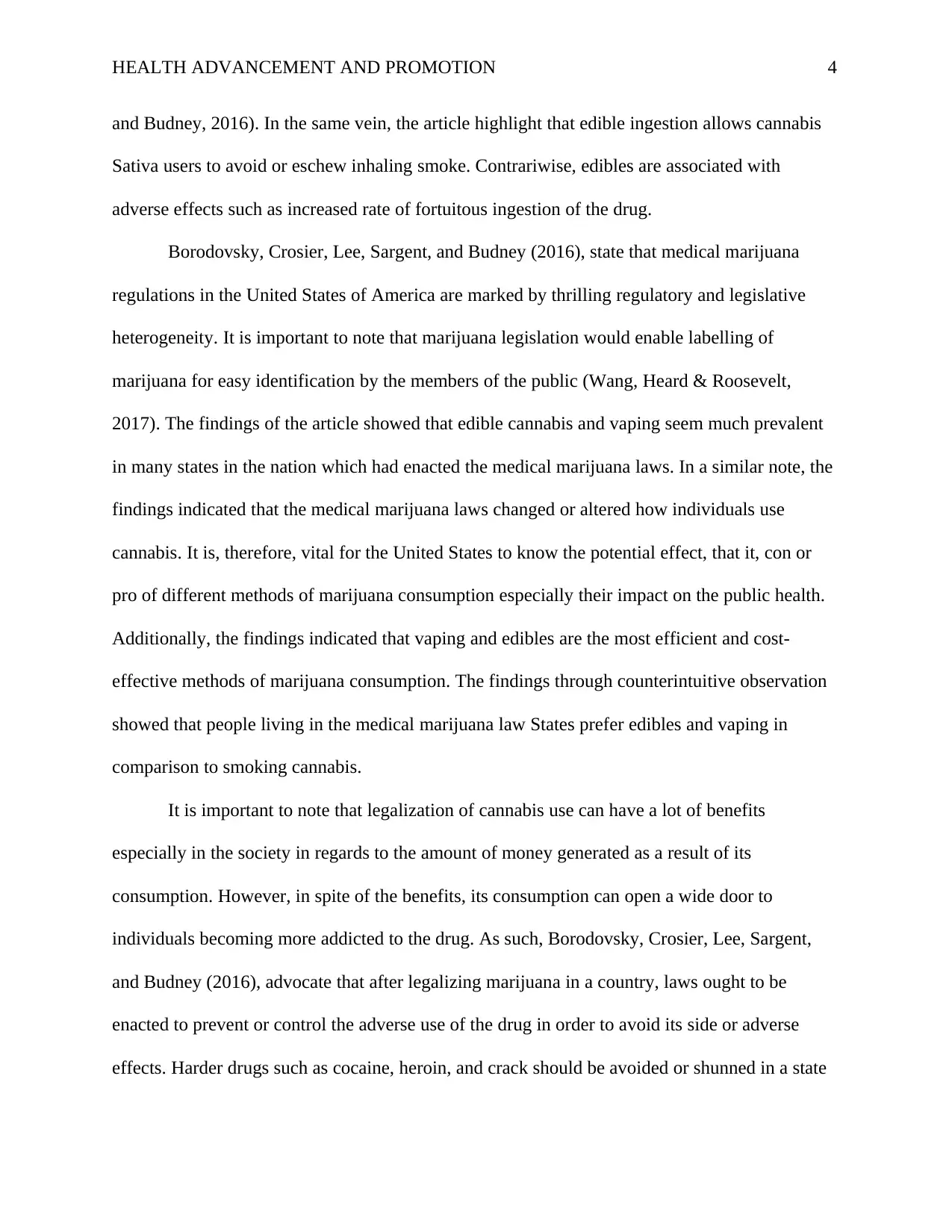
HEALTH ADVANCEMENT AND PROMOTION 4
and Budney, 2016). In the same vein, the article highlight that edible ingestion allows cannabis
Sativa users to avoid or eschew inhaling smoke. Contrariwise, edibles are associated with
adverse effects such as increased rate of fortuitous ingestion of the drug.
Borodovsky, Crosier, Lee, Sargent, and Budney (2016), state that medical marijuana
regulations in the United States of America are marked by thrilling regulatory and legislative
heterogeneity. It is important to note that marijuana legislation would enable labelling of
marijuana for easy identification by the members of the public (Wang, Heard & Roosevelt,
2017). The findings of the article showed that edible cannabis and vaping seem much prevalent
in many states in the nation which had enacted the medical marijuana laws. In a similar note, the
findings indicated that the medical marijuana laws changed or altered how individuals use
cannabis. It is, therefore, vital for the United States to know the potential effect, that it, con or
pro of different methods of marijuana consumption especially their impact on the public health.
Additionally, the findings indicated that vaping and edibles are the most efficient and cost-
effective methods of marijuana consumption. The findings through counterintuitive observation
showed that people living in the medical marijuana law States prefer edibles and vaping in
comparison to smoking cannabis.
It is important to note that legalization of cannabis use can have a lot of benefits
especially in the society in regards to the amount of money generated as a result of its
consumption. However, in spite of the benefits, its consumption can open a wide door to
individuals becoming more addicted to the drug. As such, Borodovsky, Crosier, Lee, Sargent,
and Budney (2016), advocate that after legalizing marijuana in a country, laws ought to be
enacted to prevent or control the adverse use of the drug in order to avoid its side or adverse
effects. Harder drugs such as cocaine, heroin, and crack should be avoided or shunned in a state
and Budney, 2016). In the same vein, the article highlight that edible ingestion allows cannabis
Sativa users to avoid or eschew inhaling smoke. Contrariwise, edibles are associated with
adverse effects such as increased rate of fortuitous ingestion of the drug.
Borodovsky, Crosier, Lee, Sargent, and Budney (2016), state that medical marijuana
regulations in the United States of America are marked by thrilling regulatory and legislative
heterogeneity. It is important to note that marijuana legislation would enable labelling of
marijuana for easy identification by the members of the public (Wang, Heard & Roosevelt,
2017). The findings of the article showed that edible cannabis and vaping seem much prevalent
in many states in the nation which had enacted the medical marijuana laws. In a similar note, the
findings indicated that the medical marijuana laws changed or altered how individuals use
cannabis. It is, therefore, vital for the United States to know the potential effect, that it, con or
pro of different methods of marijuana consumption especially their impact on the public health.
Additionally, the findings indicated that vaping and edibles are the most efficient and cost-
effective methods of marijuana consumption. The findings through counterintuitive observation
showed that people living in the medical marijuana law States prefer edibles and vaping in
comparison to smoking cannabis.
It is important to note that legalization of cannabis use can have a lot of benefits
especially in the society in regards to the amount of money generated as a result of its
consumption. However, in spite of the benefits, its consumption can open a wide door to
individuals becoming more addicted to the drug. As such, Borodovsky, Crosier, Lee, Sargent,
and Budney (2016), advocate that after legalizing marijuana in a country, laws ought to be
enacted to prevent or control the adverse use of the drug in order to avoid its side or adverse
effects. Harder drugs such as cocaine, heroin, and crack should be avoided or shunned in a state
Paraphrase This Document
Need a fresh take? Get an instant paraphrase of this document with our AI Paraphraser
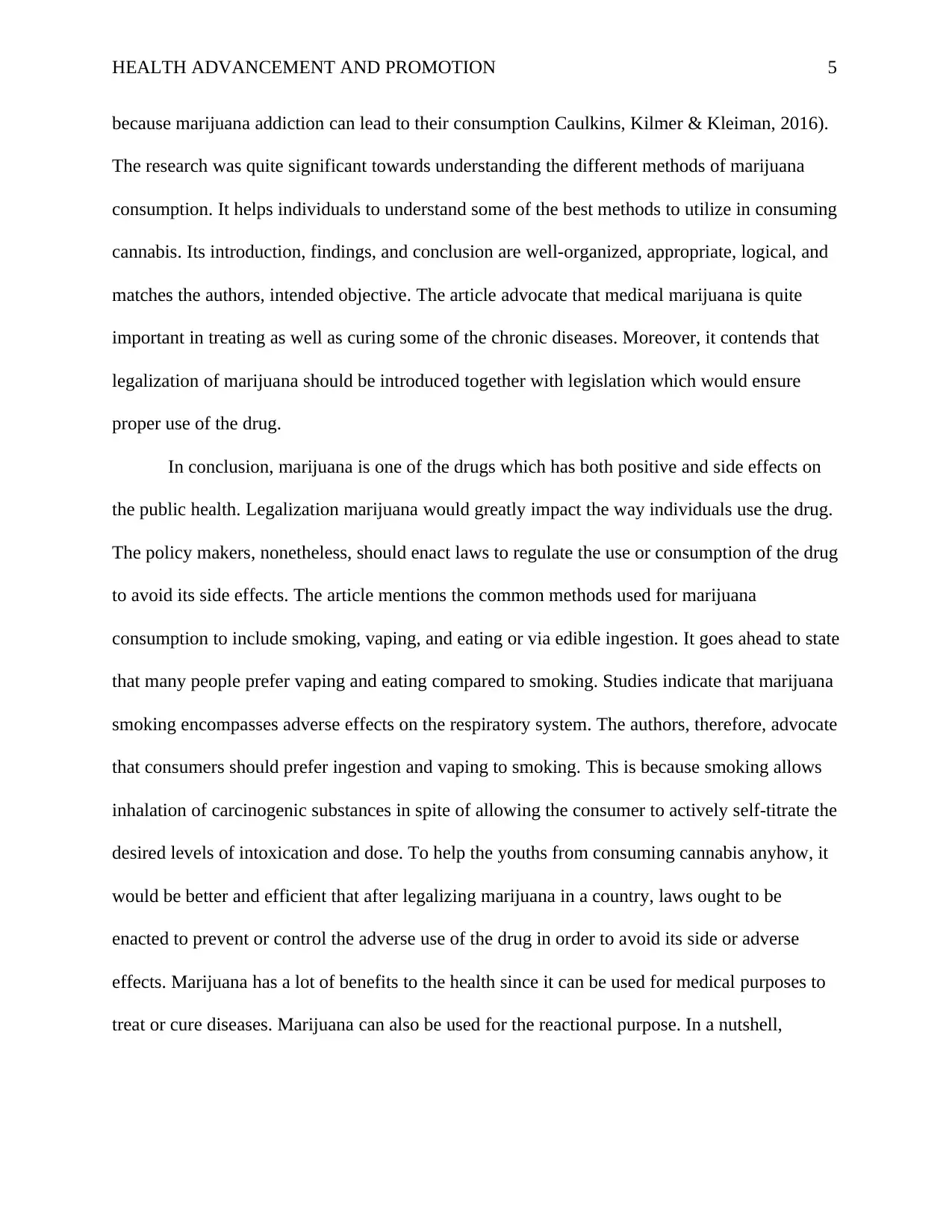
HEALTH ADVANCEMENT AND PROMOTION 5
because marijuana addiction can lead to their consumption Caulkins, Kilmer & Kleiman, 2016).
The research was quite significant towards understanding the different methods of marijuana
consumption. It helps individuals to understand some of the best methods to utilize in consuming
cannabis. Its introduction, findings, and conclusion are well-organized, appropriate, logical, and
matches the authors, intended objective. The article advocate that medical marijuana is quite
important in treating as well as curing some of the chronic diseases. Moreover, it contends that
legalization of marijuana should be introduced together with legislation which would ensure
proper use of the drug.
In conclusion, marijuana is one of the drugs which has both positive and side effects on
the public health. Legalization marijuana would greatly impact the way individuals use the drug.
The policy makers, nonetheless, should enact laws to regulate the use or consumption of the drug
to avoid its side effects. The article mentions the common methods used for marijuana
consumption to include smoking, vaping, and eating or via edible ingestion. It goes ahead to state
that many people prefer vaping and eating compared to smoking. Studies indicate that marijuana
smoking encompasses adverse effects on the respiratory system. The authors, therefore, advocate
that consumers should prefer ingestion and vaping to smoking. This is because smoking allows
inhalation of carcinogenic substances in spite of allowing the consumer to actively self-titrate the
desired levels of intoxication and dose. To help the youths from consuming cannabis anyhow, it
would be better and efficient that after legalizing marijuana in a country, laws ought to be
enacted to prevent or control the adverse use of the drug in order to avoid its side or adverse
effects. Marijuana has a lot of benefits to the health since it can be used for medical purposes to
treat or cure diseases. Marijuana can also be used for the reactional purpose. In a nutshell,
because marijuana addiction can lead to their consumption Caulkins, Kilmer & Kleiman, 2016).
The research was quite significant towards understanding the different methods of marijuana
consumption. It helps individuals to understand some of the best methods to utilize in consuming
cannabis. Its introduction, findings, and conclusion are well-organized, appropriate, logical, and
matches the authors, intended objective. The article advocate that medical marijuana is quite
important in treating as well as curing some of the chronic diseases. Moreover, it contends that
legalization of marijuana should be introduced together with legislation which would ensure
proper use of the drug.
In conclusion, marijuana is one of the drugs which has both positive and side effects on
the public health. Legalization marijuana would greatly impact the way individuals use the drug.
The policy makers, nonetheless, should enact laws to regulate the use or consumption of the drug
to avoid its side effects. The article mentions the common methods used for marijuana
consumption to include smoking, vaping, and eating or via edible ingestion. It goes ahead to state
that many people prefer vaping and eating compared to smoking. Studies indicate that marijuana
smoking encompasses adverse effects on the respiratory system. The authors, therefore, advocate
that consumers should prefer ingestion and vaping to smoking. This is because smoking allows
inhalation of carcinogenic substances in spite of allowing the consumer to actively self-titrate the
desired levels of intoxication and dose. To help the youths from consuming cannabis anyhow, it
would be better and efficient that after legalizing marijuana in a country, laws ought to be
enacted to prevent or control the adverse use of the drug in order to avoid its side or adverse
effects. Marijuana has a lot of benefits to the health since it can be used for medical purposes to
treat or cure diseases. Marijuana can also be used for the reactional purpose. In a nutshell,
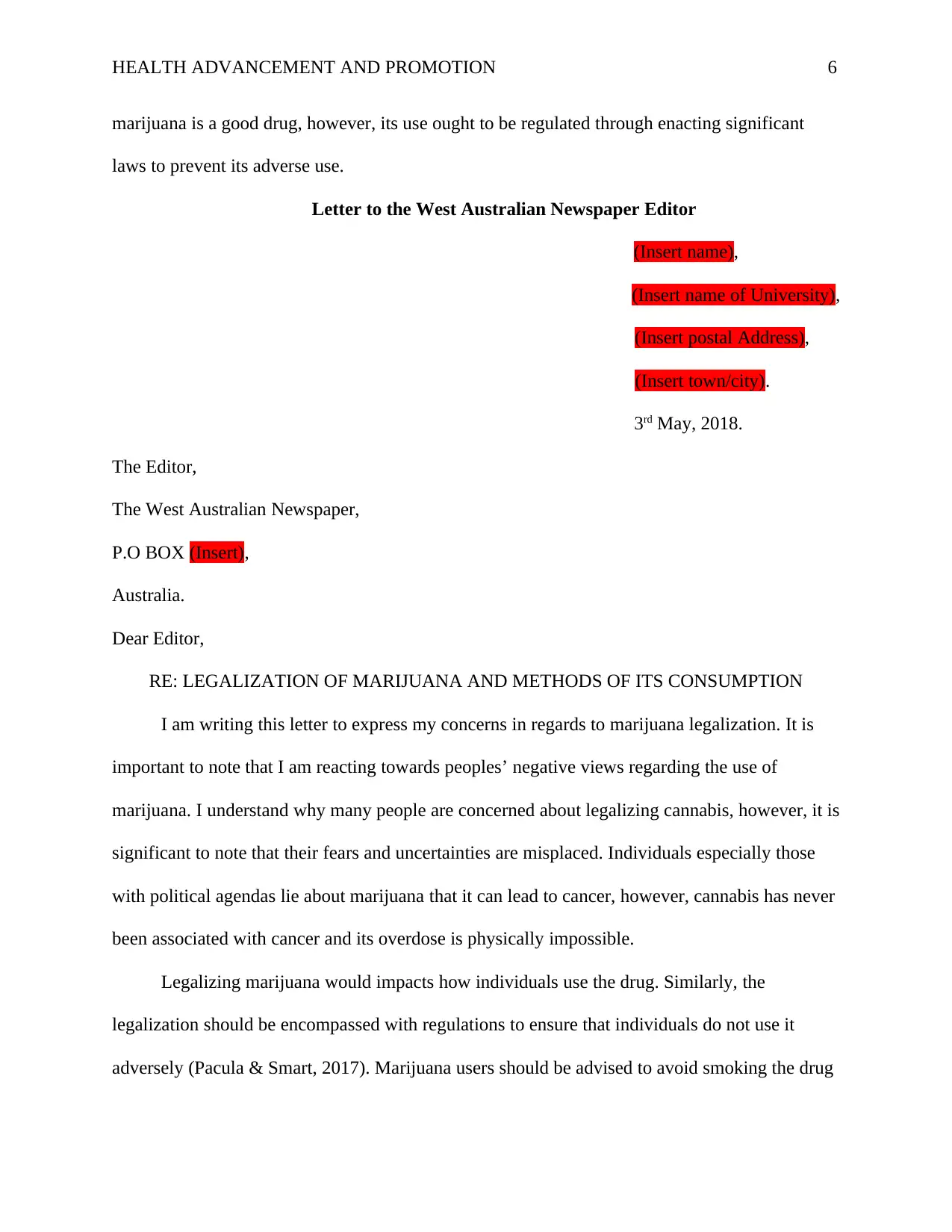
HEALTH ADVANCEMENT AND PROMOTION 6
marijuana is a good drug, however, its use ought to be regulated through enacting significant
laws to prevent its adverse use.
Letter to the West Australian Newspaper Editor
(Insert name),
(Insert name of University),
(Insert postal Address),
(Insert town/city).
3rd May, 2018.
The Editor,
The West Australian Newspaper,
P.O BOX (Insert),
Australia.
Dear Editor,
RE: LEGALIZATION OF MARIJUANA AND METHODS OF ITS CONSUMPTION
I am writing this letter to express my concerns in regards to marijuana legalization. It is
important to note that I am reacting towards peoples’ negative views regarding the use of
marijuana. I understand why many people are concerned about legalizing cannabis, however, it is
significant to note that their fears and uncertainties are misplaced. Individuals especially those
with political agendas lie about marijuana that it can lead to cancer, however, cannabis has never
been associated with cancer and its overdose is physically impossible.
Legalizing marijuana would impacts how individuals use the drug. Similarly, the
legalization should be encompassed with regulations to ensure that individuals do not use it
adversely (Pacula & Smart, 2017). Marijuana users should be advised to avoid smoking the drug
marijuana is a good drug, however, its use ought to be regulated through enacting significant
laws to prevent its adverse use.
Letter to the West Australian Newspaper Editor
(Insert name),
(Insert name of University),
(Insert postal Address),
(Insert town/city).
3rd May, 2018.
The Editor,
The West Australian Newspaper,
P.O BOX (Insert),
Australia.
Dear Editor,
RE: LEGALIZATION OF MARIJUANA AND METHODS OF ITS CONSUMPTION
I am writing this letter to express my concerns in regards to marijuana legalization. It is
important to note that I am reacting towards peoples’ negative views regarding the use of
marijuana. I understand why many people are concerned about legalizing cannabis, however, it is
significant to note that their fears and uncertainties are misplaced. Individuals especially those
with political agendas lie about marijuana that it can lead to cancer, however, cannabis has never
been associated with cancer and its overdose is physically impossible.
Legalizing marijuana would impacts how individuals use the drug. Similarly, the
legalization should be encompassed with regulations to ensure that individuals do not use it
adversely (Pacula & Smart, 2017). Marijuana users should be advised to avoid smoking the drug
⊘ This is a preview!⊘
Do you want full access?
Subscribe today to unlock all pages.

Trusted by 1+ million students worldwide
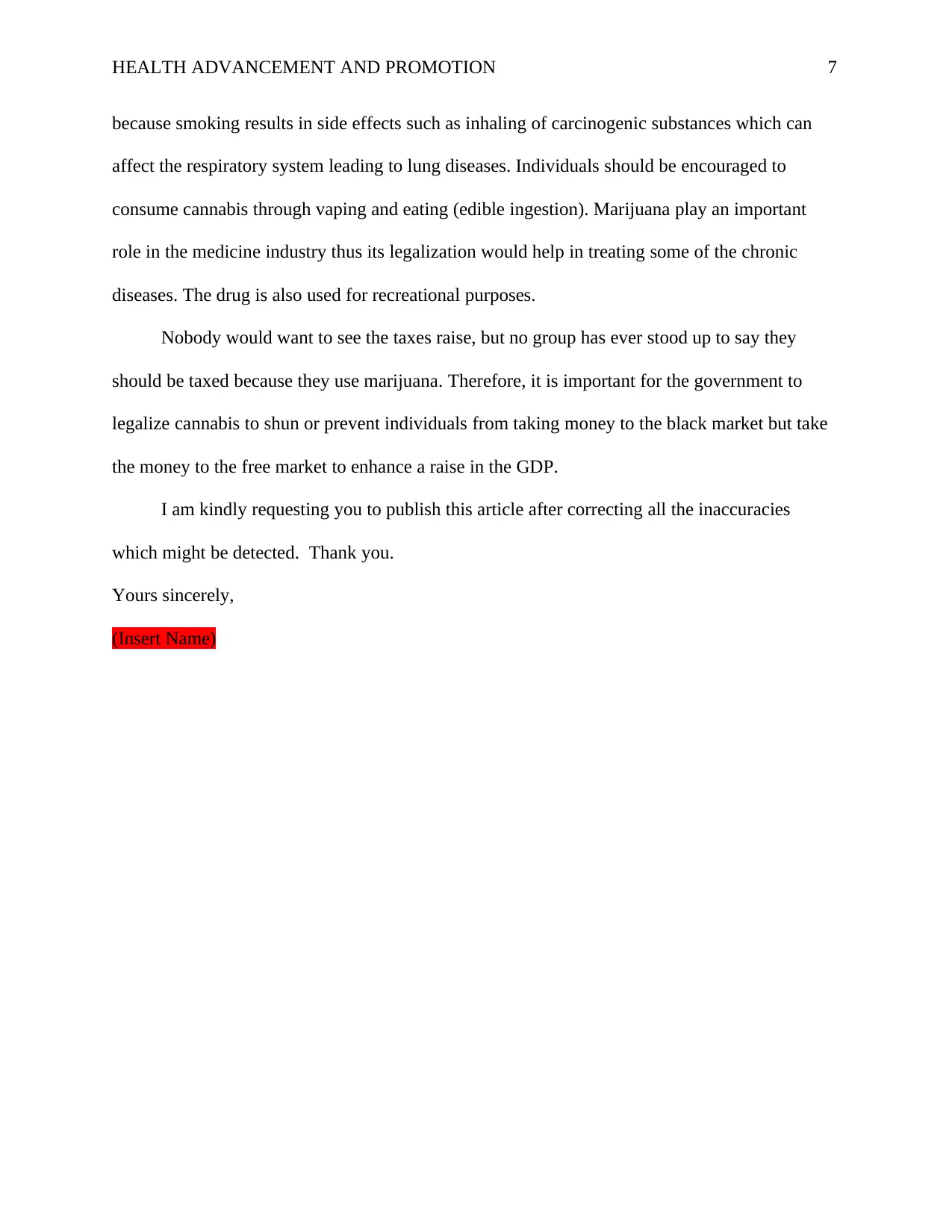
HEALTH ADVANCEMENT AND PROMOTION 7
because smoking results in side effects such as inhaling of carcinogenic substances which can
affect the respiratory system leading to lung diseases. Individuals should be encouraged to
consume cannabis through vaping and eating (edible ingestion). Marijuana play an important
role in the medicine industry thus its legalization would help in treating some of the chronic
diseases. The drug is also used for recreational purposes.
Nobody would want to see the taxes raise, but no group has ever stood up to say they
should be taxed because they use marijuana. Therefore, it is important for the government to
legalize cannabis to shun or prevent individuals from taking money to the black market but take
the money to the free market to enhance a raise in the GDP.
I am kindly requesting you to publish this article after correcting all the inaccuracies
which might be detected. Thank you.
Yours sincerely,
(Insert Name)
because smoking results in side effects such as inhaling of carcinogenic substances which can
affect the respiratory system leading to lung diseases. Individuals should be encouraged to
consume cannabis through vaping and eating (edible ingestion). Marijuana play an important
role in the medicine industry thus its legalization would help in treating some of the chronic
diseases. The drug is also used for recreational purposes.
Nobody would want to see the taxes raise, but no group has ever stood up to say they
should be taxed because they use marijuana. Therefore, it is important for the government to
legalize cannabis to shun or prevent individuals from taking money to the black market but take
the money to the free market to enhance a raise in the GDP.
I am kindly requesting you to publish this article after correcting all the inaccuracies
which might be detected. Thank you.
Yours sincerely,
(Insert Name)
Paraphrase This Document
Need a fresh take? Get an instant paraphrase of this document with our AI Paraphraser
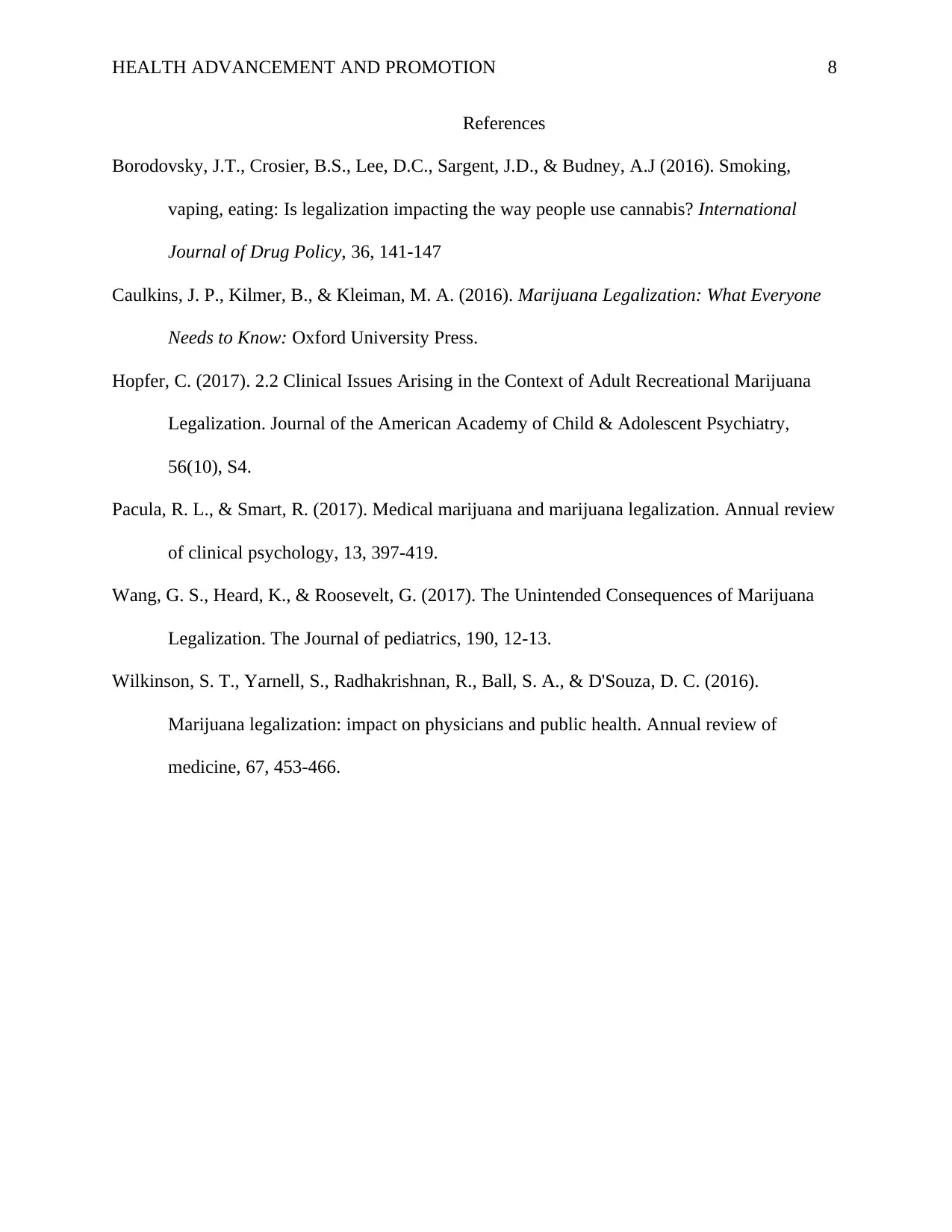
HEALTH ADVANCEMENT AND PROMOTION 8
References
Borodovsky, J.T., Crosier, B.S., Lee, D.C., Sargent, J.D., & Budney, A.J (2016). Smoking,
vaping, eating: Is legalization impacting the way people use cannabis? International
Journal of Drug Policy, 36, 141-147
Caulkins, J. P., Kilmer, B., & Kleiman, M. A. (2016). Marijuana Legalization: What Everyone
Needs to Know: Oxford University Press.
Hopfer, C. (2017). 2.2 Clinical Issues Arising in the Context of Adult Recreational Marijuana
Legalization. Journal of the American Academy of Child & Adolescent Psychiatry,
56(10), S4.
Pacula, R. L., & Smart, R. (2017). Medical marijuana and marijuana legalization. Annual review
of clinical psychology, 13, 397-419.
Wang, G. S., Heard, K., & Roosevelt, G. (2017). The Unintended Consequences of Marijuana
Legalization. The Journal of pediatrics, 190, 12-13.
Wilkinson, S. T., Yarnell, S., Radhakrishnan, R., Ball, S. A., & D'Souza, D. C. (2016).
Marijuana legalization: impact on physicians and public health. Annual review of
medicine, 67, 453-466.
References
Borodovsky, J.T., Crosier, B.S., Lee, D.C., Sargent, J.D., & Budney, A.J (2016). Smoking,
vaping, eating: Is legalization impacting the way people use cannabis? International
Journal of Drug Policy, 36, 141-147
Caulkins, J. P., Kilmer, B., & Kleiman, M. A. (2016). Marijuana Legalization: What Everyone
Needs to Know: Oxford University Press.
Hopfer, C. (2017). 2.2 Clinical Issues Arising in the Context of Adult Recreational Marijuana
Legalization. Journal of the American Academy of Child & Adolescent Psychiatry,
56(10), S4.
Pacula, R. L., & Smart, R. (2017). Medical marijuana and marijuana legalization. Annual review
of clinical psychology, 13, 397-419.
Wang, G. S., Heard, K., & Roosevelt, G. (2017). The Unintended Consequences of Marijuana
Legalization. The Journal of pediatrics, 190, 12-13.
Wilkinson, S. T., Yarnell, S., Radhakrishnan, R., Ball, S. A., & D'Souza, D. C. (2016).
Marijuana legalization: impact on physicians and public health. Annual review of
medicine, 67, 453-466.
1 out of 8
Related Documents
Your All-in-One AI-Powered Toolkit for Academic Success.
+13062052269
info@desklib.com
Available 24*7 on WhatsApp / Email
![[object Object]](/_next/static/media/star-bottom.7253800d.svg)
Unlock your academic potential
Copyright © 2020–2026 A2Z Services. All Rights Reserved. Developed and managed by ZUCOL.





